Here are all the resources you need in your homeschool for National Poetry Month, plus ideas for enjoying poetry any day of the year!
April is National Poetry Month according to the Academy of American Poets. An excuse for more poems in my life and homeschool? I’m all in!
I hope this page can be a bookmarked resource for you and your family as you relish poetry in your daily life year-round. Whether you have long loved poetry or are a skeptic in need of convincing, you may find something new here to spark your interest!
{And don’t forget to check out the Year of Memory Work while you’re here! 52 weeks of printable poems and video recitations!}

What is poetry?
Bob Dylan said, “It’s not easy to define poetry.”
Samuel Taylor Coleridge tried to define it anyway: “Poetry: the best words in the best order.”
Robert Frost asserted that, “Poetry is when an emotion has found its thought and the thought has found words.”
What is the difference between prose and poetry? “If I read a book and it makes my whole body so cold no fire can ever warm me, I know that is poetry,” explained Emily Dickinson.
William Butler Yeats put it this way: “We make out of the quarrel with others, rhetoric, but of the quarrel with ourselves, poetry.”
John Keats opined that, “Poetry should… strike the reader as a wording of his own highest thoughts, and appear almost a remembrance.”
How do you write a poem? “A poem begins as a lump in the throat, a sense of wrong, a homesickness, a lovesickness,” Robert Frost acknowledged.
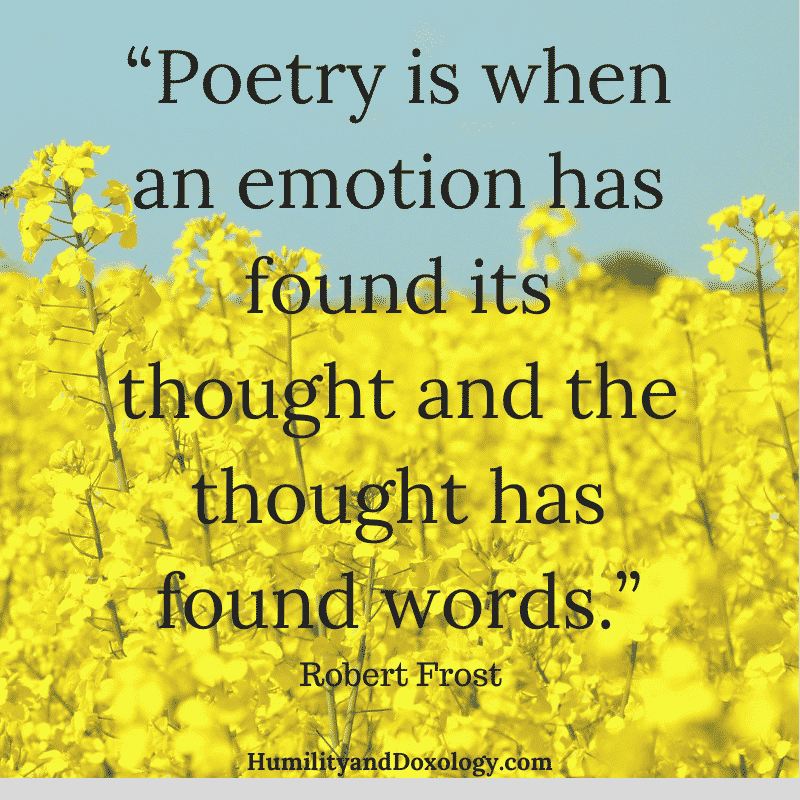
{This post contains affiliate links. Please see the disclaimer.}
National Poetry Month in your Homeschool: simple ways to introduce poetry to your children
My biggest advice for introducing children to poetry? Just read it to them. All the time. Don’t worry about picking the “right” or “best” poems. You could begin with some you already know and love, or pick an anthology up at the library and just start there. Even teens can weave poetry activities into their high school studies.
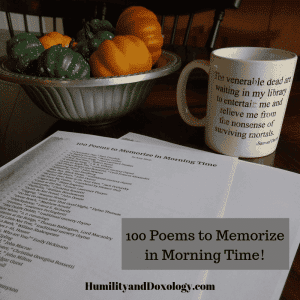
Skip the poems you don’t like! Our goal is to develop a taste for this exhilarating (but sometimes intimidating) genre, so it does not really matter if you start with “Casey at the Bat” or Homer! Don’t wait for the perfect poem or best method; just start reading a poem aloud.
If you get frozen at the thought of picking out your first poetry book, I highly recommend A Child’s Introduction to Poetry. It comes with a CD, so you won’t even need to read the poems aloud yourself to begin. I actually credit this CD with first getting my young children excited about poetry!

We checked this title out from the library so many times, I eventually just bought our own copy. I don’t remember reading the book very often, but we started listening to the CD on repeat when my oldest was maybe 4 or 5. I still remember him running down the upstairs hallway at bedtime shouting, “RAGE! RAGE AGAINST THE DYING OF THE LIGHT!” The narrators are straightforward, and there is a wide variety of the silly and the serious. This makes an excellent car ride listen if you have some folks not so sure about poems in your house.
If you can only invest in one poetry anthology, I think that Favorite Poems Old and New is an excellent choice. My brother and I loved to pull from it as we grew up (I particularly remember “Laughing Time” and “The Highwayman” as 2 favorites), and now I use it frequently with my own children.

One of the most fascinating aspects of literature is the conversation between one author and another. Most of the time it is rather subtle or unconscious, but sometimes it is very much on-purpose. A friend once gave me a fascinating little collection of poetry entitled Conversation Pieces: Poems that Talk to Other Poems. The first conversation, for example, begins with “The Passionate Shepherd to His Love,” continues with Raleigh’s famous reply, and carries on through 7 more poets including a poem by William Carlos Williams and another poem entitled “Williams was Wrong.” So much fun!
I would note that some of the modern poetry pieces included in the book may not be appropriate for your youngest readers, so just be aware. I’m not suggesting you hand the book in its entirety to your 7 year old. This is a fabulous book for your own scholé!

Should you study poems or enjoy them?
Well, perhaps that is a false dichotomy. But while I certainly agree that understanding the mechanics of poetry is an important skill, especially valuable for an older student (and if this is where you are, I recommend starting with the resources here or here), I believe that the essential first step is to learn how to love poetry, whether during National Poetry Month or your regular homeschool routine.
I am currently re-reading The Awakening of Miss Prim by Natalia Sanmartin Fenollera, and was struck by this quote:
“We know lots of parts of poem and stories by heart – it’s the first thing we do with all books…He says it’s how you learn to love books; it’s got a lot to do with memory. He says that when men fall in love with women they learn their faces by heart so they can remember them later. They notice the color of their eyes, the color of their hair; whether they like music, prefer chocolate or biscuits, what their brothers and sisters are called, whether they write a diary, or have a cat…It’s the same thing with books…In lessons we learn bits by heart and recite them. Then we read the books and discuss them and then we read them again.”
…
“So your uncle believes you should enjoy books, not study them?”
Please, do not destroy the love and enjoyment of poetry by dissecting each poem your family reads any more than you would begin to teach your children to love bird-watching through repeated dissection and anatomical discussions. Yes, those have their place to further knowledge and understanding. But you shouldn’t start there.
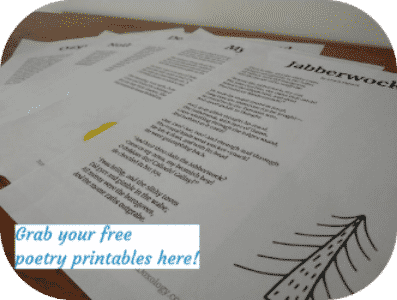
Want even more homeschool poetry resources for National Poetry Month and beyond? Check out these other posts and videos:
I plan to celebrate “Carry a Poem in Your Pocket” day. No. Seriously. It’s a real thing. John Adams would be proud, since he once said that “you will never be alone with a poet in your pocket.” I even created some free printables to make the choice of what to put in your pocket a little easier.
- The Year of Memory Work (52 weeks of video recitations and printables…FREE)
- Ultimate Poetry Book List
- Poem in Your Pocket Day printables
- Exploring Shakespeare with Children
- 12 Poems Everyone Should Know By Heart
- 100 Poems to Memorize in Morning Time
- How to Choose the Best Memory Work
- Can you Haiku?
- Poetry Free Writing
- What is Morning Time?
- Facebook Live sharing 4 new poetry books I’m excited about
- YouTube playlist of my Year of Memory Work recitations
I once interviewed my 10 year old daughter to get her unrehearsed thoughts on poetry. (Click through to see links to many of the resources and poems we discussed.) It fascinated me to hear the poem she brought to share as her favorite bit of Shakespeare. She is not quite sure why she loves it, or what it all means. I am convinced, however, that the beauty of the poem that has sunk into her heart will grow and flourish along with her as she matures. T. S. Eliot once postulated that “genuine poetry can communicate before it’s understood.”
Come by Facebook or Instagram and let me know what poetry you’ve relished this week. Don’t forget to sign up for my email list for subscriber exclusives!


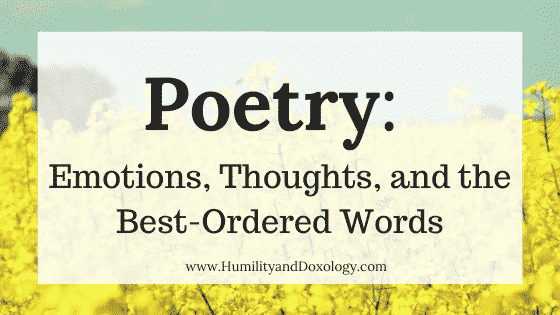



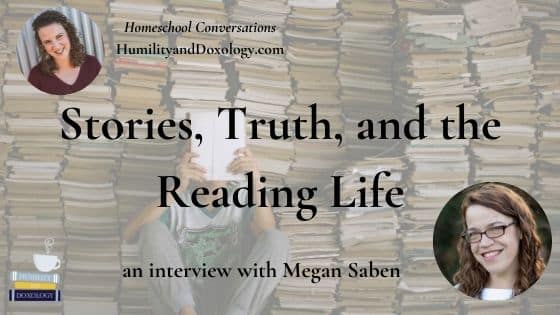
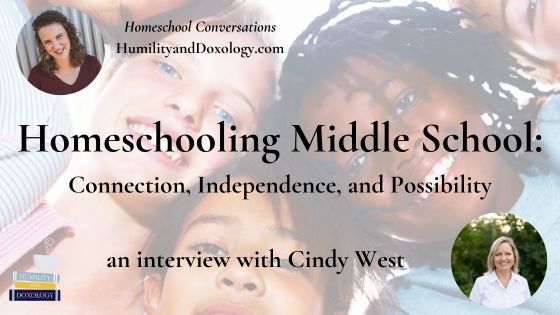
Great advice for enjoying poetry! I’m going to keep on the lookout for that collection you mentioned as it is one I do not have. I find a lot of great collections at used book sales. Here is a list of some of our favorite poems to read aloud and lots of them are available for free on the web: https://bookishfamily.blogspot.com/2018/02/poetry-to-read-aloud.html
You list so many of our favorites! That’s a great resource; thanks for sharing. I love how you mention using poetry in your morningtime. That is one of the primary places we incorporate our poetry memorization, too! https://www.humilityanddoxology.com/morning-gathering-memory-laughter-relationship/)
Pingback: Poem in your Pocket Day: Free Printables – Humility and Doxology
Pingback: 12 Poems Every Child and Adult Should Memorize and Know By Heart – Humility and Doxology
Pingback: Ultimate Poetry Book List for Tots to Teens (and Their Adults) – Humility and Doxology
Pingback: Do You Know About These Poetry Books? – Humility and Doxology
Pingback: Playing with Words: Poetry Free Writing – Humility and Doxology